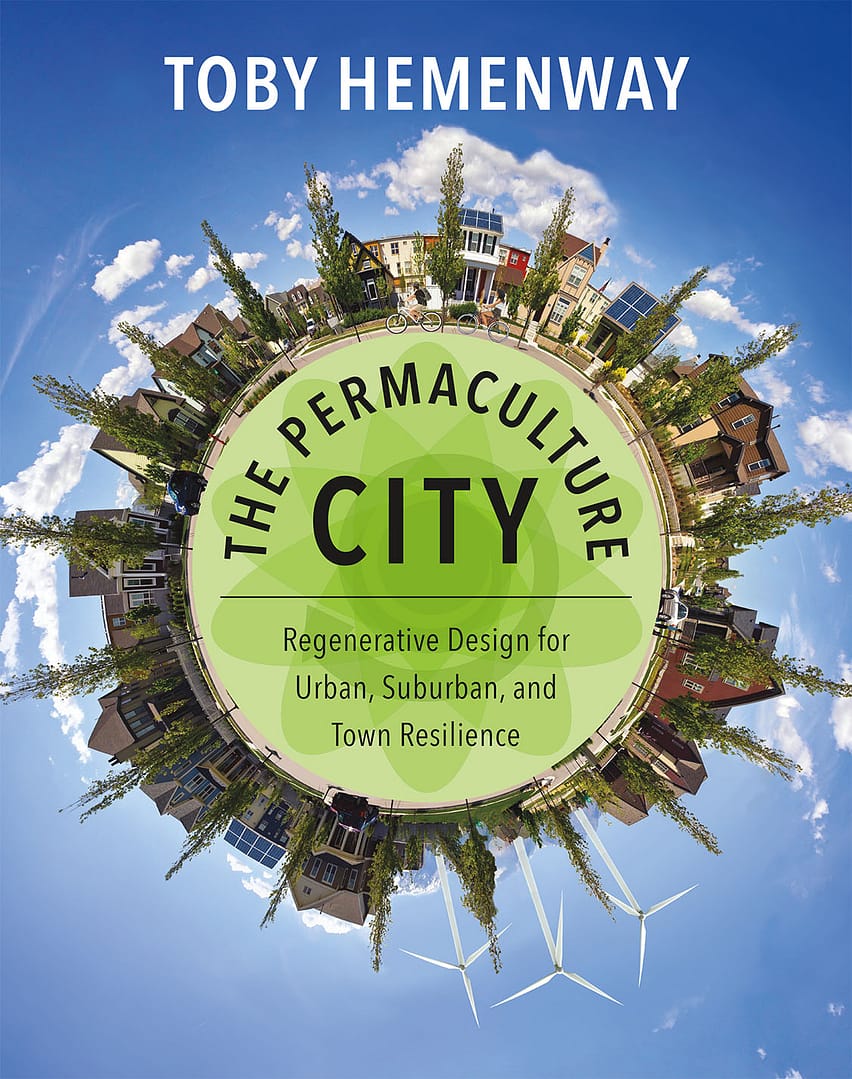| Pages: | 288 pages |
| Book Art: | Color photos, charts, graphs, and illustrations |
| Size: | 7.5 x 9.5 inch |
| Publisher: | Chelsea Green Publishing |
| Pub. Date: | July 31, 2015 |
| ISBN: | 9781603585262 |
The Permaculture City
Regenerative Design for Urban, Suburban, and Town Resilience
Permaculture is more than just the latest buzzword; it offers positive solutions for many of the environmental and social challenges confronting us. And nowhere are those remedies more needed and desired than in our cities.
The Permaculture City provides a new way of thinking about urban living, with practical examples for creating abundant food, energy security, close-knit communities, local and meaningful livelihoods, and sustainable policies in our cities and towns. The same nature-based approach that works so beautifully for growing food—connecting the pieces of the landscape together in harmonious ways—applies perfectly to many of our other needs. Toby Hemenway, one of the leading practitioners and teachers of permaculture design, illuminates a new way forward through examples of edge-pushing innovations, along with a deeply holistic conceptual framework for our cities, towns, and suburbs.
The Permaculture City begins in the garden but takes what we have learned there and applies it to a much broader range of human experience; we’re not just gardening plants but people, neighborhoods, and even cultures. Hemenway lays out how permaculture design can help towndwellers solve the challenges of meeting our needs for food, water, shelter, energy, community, and livelihood in sustainable, resilient ways. Readers will find new information on designing the urban home garden and strategies for gardening in community, rethinking our water and energy systems, learning the difference between a “job” and a “livelihood,” and the importance of placemaking and an empowered community.
This important book documents the rise of a new sophistication, depth, and diversity in the approaches and thinking of permaculture designers and practitioners. Understanding nature can do more than improve how we grow, make, or consume things; it can also teach us how to cooperate, make decisions, and arrive at good solutions.
Reviews and Praise
Booklist-
"For the past six years, Hemenway’s acclaimed first book, Gaia’s Garden (2009), has been the world’s best-selling guidebook on home and garden permaculture. He now continues to champion this environmental philosophy that involves working with nature, instead of against it, for maximum sustainability. Although permaculture practices originally began with small-scale farms and gardens in mind, in his latest work Hemenway presents a much larger vision of applying them to metropolitan settings. In what is more than simply a handbook on finding space to grow fruits and vegetables in the concrete jungle, the author demonstrates just how widely the permaculture net can be cast by including advice on sustainably managing critical urban resources such as water, shelter, electricity, and even community centers. After introductory chapters on permaculture principles and the history and evolution of cities, Hemenway covers the basics of designing urban home gardens before moving on to discuss “water wisdom” and home energy solutions. An invaluable resource for city planners and dwellers alike, as well as an optimistic exploration of the possibilities for ecological well-being in our future urban landscapes.”
More Reviews and Praise
Library Journal-
"Permaculture refers to a method of agricultural design that uses natural approaches. While several chapters address the unique challenges and opportunities in creating an urban garden, Hemenway refers often to his first book, Gaia’s Garden, the initial major volume published in North America on permaculture principles, for further detail. Here, the author’s focus narrows to an urban setting, where permaculture means more than having a sustainable garden but can generate powerful change and community growth. Combining anecdotal stories of local U.S. neighborhoods practicing permaculture principles with black-and-white and color photos, Hemenway describes ways in which urban dwellers can not only create their own backyard oasis but join with their neighbors to build shared spaces in which to produce food, culture, and identity. Valuable tips on water conservation via rain harvesting and graywater collection mingle with advice on reducing energy consumption, producing local energy resources, and decreasing your foodshed and carbon footprints. Notes and index provide a reliable reference for further reading. VERDICT: An enlightening read for anyone interested in green gardening, environmental ethics, social justice issues, and seeking positive community change.”
Publishers Weekly-
"This eagerly awaited book from West Coast permaculture expert Hemenway, author of the classic Gaia's Garden, pushes permaculture design beyond its usual realm of homesteading and gardening, applying it to the complex systems that make up contemporary urban life. Other permaculturalists are also exploring these ideas, but Hemenway's intelligent, down-to-earth analyses, astute systems thinking, and clear organization offer a particularly comprehensive, open-ended, and sophisticated yet understandable overview to readers who want to discover, evaluate, utilize, and integrate the untapped resources abundant in any city or town. Hemenway focuses on the philosophical, ‘whetting appetites' and providing toolkits rather than in-depth instruction, with the goal of teaching readers 'to become adept at a whole-systems approach to living in and finding solutions in cities, towns, and suburbs.' Referencing livable-city innovators such as Jane Jacobs and human-scale design thinkers such as Christopher Alexander, Hemenway shows how permaculture concepts can be stretched and rethought in an urban setting to include not just one's house, garden, and yard but also neighbors, parks, and city agencies.”
"Many people who are searching for a more fulfilling life, wanting to reduce their ecological footprint and build resilience for uncertain futures, grasp that permaculture might be part of the solution but are often unsure how it applies to their particular situation. For residents of towns and cities in the modern affluent world, The Permaculture City shows how permaculture design makes common sense."--David Holmgren, co-originator of the Permaculture concept
"Toby Hemenway’s Gaia’s Garden is the go-to book I always recommend for those interested in permaculture. His new book, The Permaculture City, is the much-needed urban version, a great introduction and full of important information on adapting permaculture to an urban environment."--Starhawk, permaculture designer and author of The Empowerment Manual
“The Permaculture City is a triumph in bringing the wisdom of permaculture practices to city dwellers. This book is a ‘bridge book’ for greening our urban landscapes. Rich in practical knowledge, Toby Hemenway is a trailblazer in demystifying the art of living sustainably within ecosystems: teaching how YOU can be a collaborative partner in a healthy urban biosphere. This book’s impact will be increasingly significant as we inevitably march toward living in built environments. For urban planners, architects, green builders, and simply citizens who want to enjoy a higher quality of life, The Permaculture City is The Book to lead the way.”--Paul Stamets, author of Mycelium Running: How Mushrooms Can Help Save the World
“Permaculture is applied ecology, and its practice is evolving as society becomes more urbanized. As Toby Hemenway puts it, ‘We’re not just gardening plants but people, neighborhoods, and even cultures.’ Whether you’re new to permaculture or a seasoned ‘permie,’ The Permaculture City is essential: it captures the explorative state of the art in readable, often delightful prose. And, like all good permaculture books, it is eminently helpful at solving a myriad of practical problems in the home and garden.”--Richard Heinberg, Senior Fellow, Post Carbon Institute
“Toby Hemenway combines the skill of a storyteller with the vigour of experience and insight. He shows us an urban landscape with gardens, food, energy systems, and architecture that can ensure genuine sustainability. Beyond these vital elements, he also creates a template for a new kind of city: a human scale collection of village communities where quality of life is valued above quantity of output. With the majority of the human race becoming city dwellers, this is vital information for a more collaborative, intelligent, and resilient urban landscape, one that will enable us to face serious challenges now, and in the future.”--Maddy Harland, co-founder and editor of Permaculture magazine and Fellow of the Royal Society of Arts
"Toby Hemenway is among the true visionaries who can turn vision into practical action. The Permaculture City is a landmark book that will be used for decades as a compass and field guide to regenerate our world and communities. Toby depicts the virtuous circle people are already creating across the country and world, from small acts an individual can take, to larger systemic changes that only communities and societies can make. This is the gospel of building resilience from the ground up, and Toby is a true hero of our age—he shows us we’re all invited to the party.”--Kenny Ausubel, cofounder and CEO of Bioneers
“Half the world’s people now live in cities, and as Toby Hemenway convincingly demonstrates, they can be at the very forefront of the revolution in how we live. This book will thrill you!”--Bill McKibben, author of Deep Economy
“I'm someone with a strong bias towards country living and I've always thought that the phrase 'urban permaculture' is oxymoronic. I've often thought master planners should be working to revive small towns, not build more cities. Toby Hemenway has shown me the error of my ways. The function of a well-conceived city, he says, is to inspire. His book inspires.”--Albert Bates, president, Global Village Institute for Appropriate Technology
"We stand at a crossroads where long-held societal beliefs are shattered and assumptions fall before knowledge and reality. Human civilization is in the balance. Few people have grasped the significance of the moment in the way that Toby Hemenway has. His voice is particularly important at this time. The Permaculture City is his attempt to understand what we are confronted with and to skew the discussion toward sustainability. There is no doubt that his message is timely and relevant. Read this book like the life of your children depended on it … because it does.”--John D. Liu, director of the Environmental Education Media Project and visiting fellow at the Netherlands Institute of Ecology
"What a great, accessible, and timely book! The Permaculture City is a must-read for anyone who loves where they live, wishes to deepen their relationship and pleasure in and with it, and realizes that our food, water, and community resilience may depend upon it. Toby Hemenway offers great guidance for applying the lens of intentional design to increasing food self-reliance (and pleasure!), improving water efficiency and usage, and growing community, three elements that promise to improve the quality of relatedness to place as well as resilience in the face of weather and other uncertainties.
"Whether the topic is gardening in a window box or creating a community garden, catching and channeling rainwater, or redesigning an edible landscape around a suburban home, this timely book offers everyone a window into the joy and longterm fulfillment of permaculture."--Nina Simons, co-founder of Bioneers and founder of Everywoman’s Leadership








